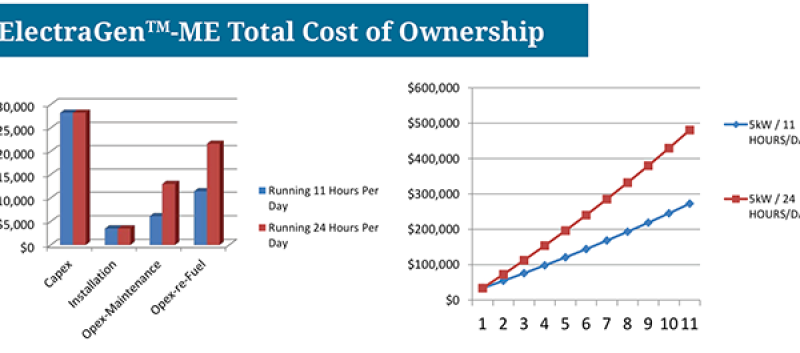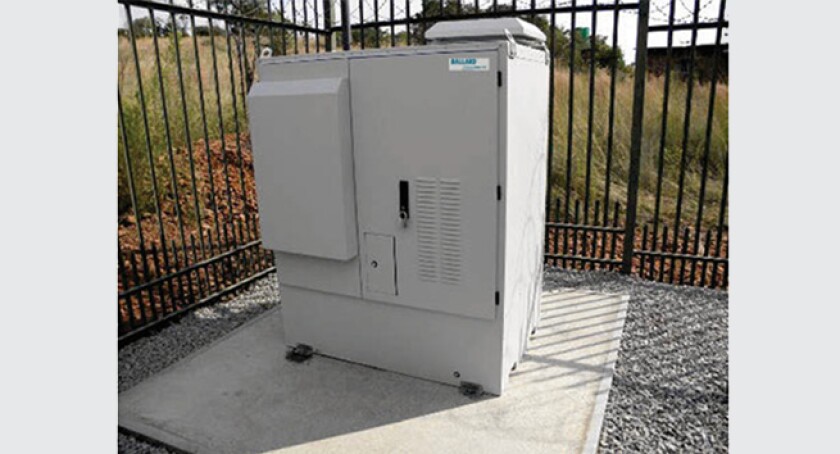Under what conditions are fuel cells a viable alternate source of power compared with diesel generators? How does the Total Cost of Ownership (TCO) and energy logistics processes compare to diesel? To find out, TowerXchange spoke to the pre-eminent fuel cell company worldwide, Ballard Power Systems, who have been at the forefront of fuel cell development for applications such as automotive, telecom backup power, material handling and buses. More recently Ballard has added focus on Engineering Services given its unmatched industry “know how” from working with Daimler and Ford and now Volkswagen. However, one of Ballard’s key commercial markets is in telecom, where their fuel cell technology is used to provide power at unreliable and off-grid cell sites and in emergency situations caused by natural disasters or extreme weather.
TowerXchange: Please introduce us to yourself and to Ballard - where do you guys fit in the telecoms infrastructure ecosystem?
Karim Kassam, VP, Corporate & Business Development, Ballard Power Systems:
One of my key priorities in this role is to leverage our products and capabilities in emerging market opportunities and build strategic alliances with partners who will deliver our solutions to telecom providers worldwide.
One of Ballard’s key commercial segments is telecom power solutions - emergency backup and supplemental power in areas where grid power is not effective or that are subject to crisis situations.
We’ve achieved great traction in disaster prone areas such as coastal communities vulnerable to floods, hurricanes or tsunamis, where fuel cell systems offer extended duration power compared with batteries and diesel gensets. Fuel cell systems can run for days before refueling, which can be critical in disaster recovery contexts.
Fuel cell systems are also effective as a replacement for diesel gensets at unreliable or off-grid sites, or where there is a need for cleaner power solutions with a smaller footprint than incumbent solutions. Southeast Asia, Africa and Latin American are key growth markets for the use of fuel cells as backup or primary power solutions for telecom cell sites.
TowerXchange: How does fuel cell technology compare to DG, DG+battery and solar-hybrid primary and backup power solutions for cell sites?
Karim Kassam, VP, Corporate & Business Development, Ballard Power Systems:
Fuel cells produce electricity without combustion, which means that, unlike internal combustion engines, they generate little (if any) noise, vibration, air pollution, or greenhouse gases and operate at high efficiencies over a wide range of loads.
Unlike batteries, fuel cells do not have a need for replacement or lengthy recharging when its fuel is spent. Additionally, since fuel cells store their fuel in external storage tanks, the maximum operating range of a fuel cell-powered device is limited only by the amount of fuel that can be carried.
One of the main value drivers for fuel cell technology in Africa is the replacement of costly diesel generators, and the eradication of pilferage. Fuels cell systems provide a mitigation strategy in markets where one of our chosen fuels, methanol, is available at a lower cost than diesel. Ballard’s ElectraGenTM-ME methanol-fuelled solution is a good choice because there is no alternate use of the fuel which means fuel theft ceases to be an issue. In addition, refueling visits to remote sites can be up to two weeks apart, depending on the size of the fuel tank, which means a significant reduction in site visits and associated opex. The main advantage of fuel cells over wind and solar power is that you are no longer dependent on weather. With a fuel cell system you can access reliable power as needed rather than having to wait for the correct weather conditions.
TowerXchange: What’s the sweet spot for your solutions in terms of grid availability?
Karim Kassam, VP, Corporate & Business Development, Ballard Power Systems:
The business case for investing in our fuel cell solutions is particularly compelling at sites requiring a minimum of 10 days between refueling visits, and where grid power is available no more than 6-8 hours per day.
TowerXchange: And what’s the sweet spot for your solutions in terms of site load?
Karim Kassam, VP, Corporate & Business Development, Ballard Power Systems:
The benefit of fuel cell solutions is that they are able to follow the site load, which improves overall efficiency. Unlike diesel generators, it is efficient to oversize the power solution from the initial installation because it will only deliver the output required. For example, we can install our 2.5kW ElectraGenTM-ME fuel cell system, run it at 800w at an efficient cost per hour, and have the capacity ready to add a second and third BTS without the need for additional capex as power requirements increase. Ballard also offers a 5kW ElectraGenTM-ME system. With fuel cell systems, you simply run the power as you require it. TowerXchange: Tell us about the capital investment required to install fuel cells at cell sites.
Karim Kassam, VP, Corporate & Business Development, Ballard Power Systems:
The cost of fuel cell power has fallen by approximately 30% per year over the last five years. While the initial capital cost may be similar or slightly above that of a diesel generator, the total cost of ownership benefits outweigh the initial investment. Positive payback over the fuel cell system lifecycle are mainly driven by reduced maintenance requirements, reduced cooling expense, longer lifetime of the fuel cell system and the elimination of costs due to generator and fuel theft.

Total cost
Reformed methanol fuel cell solution
Running 11 and 24 hours per day
External tank 1,000 liters
Economic benefits
Positive payback over lifecycle, driven by: reduced maintenance requirements; reduced cooling expense; longer lifetime associated with fuel cell system; and reduced fuel theft issues
Savings grow linearly with number of sites
TowerXchange: Talk us through the process of installing fuel cell power at cell sites.
Karim Kassam, VP, Corporate & Business Development, Ballard Power Systems:
In Africa, the installation cost of the fuel cell system is typically less than 10% of the cost of the fuel cell system itself.
Installation is simple; you lay down a pad, install the fuel cell system, and attach an external tank if needed based on site specific requirements. Local site maintenance technicians can be trained to install the solution - there’s no need for scarce, expensive, niche technical expertise.
TowerXchange: What is the typical asset lifecycle of your solutions?
Karim Kassam, VP, Corporate & Business Development, Ballard Power Systems:
We are continually focused on product development; making sure that we are responding to market requirements and delivering value to our customers. So where five years ago the forecast lifetime might have been 1,500-2,000 running hours, today our fuel cells can last 10,000 plus hours, which means you can go 3-5 years without having to replace the fuel cell stack if you are running the system at 8 hours or less per day.
TowerXchange: There’s a preconception that the refueling logistics of fuel cells can be as complex and costly as diesel - tell us about the process and change management implications of using fuel cells.
Karim Kassam, VP, Corporate & Business Development, Ballard Power Systems:
The refueling logistics of hydrogen can be a bit more challenging. Hydrogen is an excellent choice for emergency backup power where you require a system to run for up to 72 hours but very infrequently. If the requirement for power is more frequent, such as on a daily basis, our methanol-fuelled solution is a better fit.
The nice thing about methanol is that the refueling process is similar to diesel - it’s a liquid fuel, with a hub and spoke distribution model, so the change management challenges are minimal. One of the reasons we work through local channel partners in emerging markets is that they are able to locally coordinate fueling logistics, which includes validating and approving trusted fuel suppliers to assure the quality of fuel as well as the delivery of fuel to the sites.
TowerXchange: Tell us about your footprint of installed systems in Africa?
Karim Kassam, VP, Corporate & Business Development, Ballard Power Systems:
We’ve got over 300 sites with fuel cell solutions installed with Vodacom - we’ve probably got close to a couple of MWs of fuel cells installed at sites in South Africa today. We expect to be deploying approximately 100 sites per year, and are currently looking at some larger deployments beyond South Africa over the next 12 months.
We are currently working with Inala in South Africa, and have a couple of additional African partnerships under discussion. Ballard doesn’t compete with our channel partners - our role is to provide the technology, and our channel partners install and maintain our solutions according to the telco’s or towerco’s need.
TowerXchange: Is the transfer of assets from operators to independent towercos good news for companies like Ballard?
Karim Kassam, VP, Corporate & Business Development, Ballard Power Systems:
We think so. They have different perspectives on energy opex. Towercos tend to think of the cost of power per minute, and they think about energy solutions as a service rather than as capex. Towercos look at Total Cost of Ownership (TCO) so higher upfront capex solutions with payout downstream tend to be viewed more favourably by towercos than by MNOs, where we often find one part of supply chain team deals with opex, another deals with capex.
So this challenges us to come up with a financing mechanism that enables Ballard to be flexible to meet different clients’ unique requirements.
TowerXchange: Finally, please sum up how you differentiate Ballard’s solutions from other alternate energy backup power solutions for cell sites.
Karim Kassam, VP, Corporate & Business Development, Ballard Power Systems:
The reliability of fuel cell systems is a major advantage in a critical application area like wireless telecom service, compared to lead-acid batteries or diesel generators. And, our fuel cell systems are capable of providing power for an extended duration. So, with minimal maintenance requirements, these performance advantages are available to telecom customers as an attractive financial alternative to traditional solutions. Additionally, we have a unique value proposition in markets where telecoms and ESCOs are looking for power beyond the 6-8 hours per day that the grid might be available; and our solutions are often used in disaster relief scenarios where power is required for days at a time.
Ballard’s fuel cell systems are cost competitive, convenient and effective. Telecoms customers who need reliable power they can depend on should consider fuel cells as an optimal solution.

